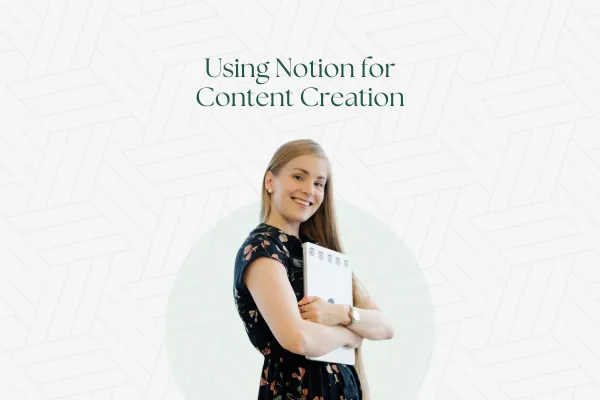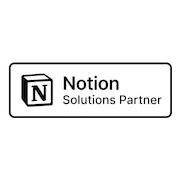Blog
Read our blog articles on Notion and systems for scalable operations.
150 K
Happy Clients.

Use Notion Templates to Stay Organized as a Content Creator
If you create content and manage your own systems, you know the struggle. Scattered files. Missed deadlines. Endless tabs. You’re juggling content across multiple platforms, and somehow your calendar never feels up to date.
This post shows you how to use Notion and the right template to finally keep your content creation in one place. Whether you're a content creator, freelance marketer, or just building your system—this is for you. The goal? Help you stay organized, create faster, and save time.
Why Content Creators Should Use Notion
If you're a content creator, chances are you're wearing multiple hats: writing blog posts, planning social media content, handling collabs, pitching clients, maybe even managing a YouTube channel. And while the creative part might be fun, the admin? Not so much.
This is where Notion steps in. It's not just a platform—it's a workspace. With the right Notion template, you can manage everything from idea to publish, all from a single page in Notion. That means fewer tools, fewer headaches, and a clearer overview of your content schedule.
Using Notion helps you build structure without being rigid. It's an easy-to-use tool that adapts to your process. Whether you’re building a personal content calendar or a full-on client dashboard, you can use Notion to keep track of everything—without jumping between Google Docs, spreadsheets, and sticky notes.
What Is a Notion Template and How Does It Work?
A Notion template is like a pre-built layout inside your Notion workspace. Think of it as a starting point. Instead of building your content planner from scratch, you just duplicate a structure that’s already set up for you.
You can find great examples in the Notion marketplace, but the best templates are the ones you tweak yourself. When you create a template that fits your exact needs—your content flow, your tone, your schedule—you’ll actually stick with it. And if you're overwhelmed by the idea of building from scratch, just start with a creator template. Many are designed specifically for content creators and are already built to track platforms like Instagram, Pinterest, or TikTok.
Want to know what makes a content creation template actually useful? It should have:
A place to brainstorm ideas
A calendar to plan ahead
A way to track status: idea, drafted, scheduled, published
A section for affiliate links or blog posts
An area to plan for collabs or campaigns
Whether you’re using a free Notion starter kit or building your own, make sure your template supports your workflow—not the other way around.
How to Create a Custom Content Planner in Notion
Your content planner should reflect how you actually work. If you create content for multiple platforms and want to manage deadlines, captions, drafts, and approvals, a static spreadsheet won’t cut it.
Here’s how to build your own inside Notion:
Start with a database that includes a calendar view
Add properties like publish date, platform, caption, and asset status
Use a status property to mark what’s scheduled, pending review, or already published
Include a to-do list for each content piece
You don’t need to make it complicated. Your planner just needs to help you manage your content across time and channel. When done right, your content in one place lets you see your entire workflow without friction.
This is a setup that scales. Whether you're a solo content creator or collaborating with a team, you can easily manage everything through your personalized Notion template.
The Best Notion Templates for Social Media Content
Social media requires consistency, planning, and lots of creative energy. Having a dedicated Notion template for social media content helps you plan out posts, campaigns, and captions without scrambling last-minute.
Look for these features in a strong creator template:
Everything is organized in databases
Allows planning for multiple platforms (Instagram, TikTok, Pinterest...)
It includes properties for key things to track (scheduled dates, visuals, affilitate links...)
A calendar view and Notion board for organizing posts
Planning templates for different content types (reels, carousels, stories...)
Here are some places where you can find ready-made paid and free Notion templates for content creation:
Templates like these don’t just keep your content scheduled. They let you actually think ahead—so you can post with purpose, not panic.
How to Build a Notion Content Hub That Works
Think of a hub as your content command center. It’s where all your tools, systems, and creative materials live. The goal is to bring everything together in one place, so you never lose track of anything again.
Here’s what to include in your Notion content hub:
Databases for storing all your ideas, posts, and assets
A main dashboard that surfaces upcoming deadlines and tasks
Templates for each type of content you produce
A planner and a tracker to keep things moving
This isn’t about making something fancy—it’s about building something functional. A good hub simplifies your work and lets you get more done with less stress.
Using Notion Boards, Trackers, and Calendars Together
When you combine boards, trackers, and calendars, you unlock the full power of Notion. Each view helps you see your content from a different angle, and together, they give you clarity.
Here are the most relevant Notion views for content planning:
Calendar view: See an overview of what has been scheduled for when
Board view: See where each piece of content is in your process
Table view: Great for listing specific content creation tasks or batch editing multiple posts at once
Chart view: For showcasing insights on your content performance
How to Stay Organized with One Notion Workspace
Your workspace in Notion should be the place where everything comes together.
You don’t need five tools to plan content, track progress, and meet deadlines. You just need one project management template designed to help you stay organized. With the right setup, you can manage campaigns, track goals, and even collaborate with your team—all without leaving Notion.
And yes, this is fully achievable even with a free Notion plan.
Ways to Use Notion for Instagram, Pinterest, TikTok, and More
Every platform has its quirks. What works on Instagram might flop on Pinterest, and TikTok is a whole different game. But your system doesn’t need to change every time.
You can use Notion to:
Plan social media campaigns for multiple channels
Create dedicated checklists and instructions for each channel
Have post templates specific for each channel
Track hashtags, trends, and audience engagement
These are just a few ways to use Notion to make managing multiple social media platforms easier. With a flexible layout and a little strategy, Notion can help you juggle everything without chaos.
How to Customize Your Notion Setup and Start Today
Here’s the good news: you don’t have to build everything from scratch.
You can start with a content creation template from Notion's very own template marketplace, tweak it, and scale it as you grow.
That said, one downside of using a pre-made template is that it’s not fully customized to how you work as a business. Most templates are designed to be flexible, but they’re not tailored to your exact content process, team size, or decision-making flow. And that can lead to workarounds, friction, or systems that never really stick.
If you’d rather skip the guesswork and have something built specifically for your team, we can help with that. We design custom setups, dashboards, content planners, and advanced automations that match the way you actually work—whether you're a team of one or managing a full content operation.
👉 Book a call here if you want a setup that just works—without the trial and error.
Copyright 2025 Taimi Ventures Oy, Taina Pereenniemi, All Rights Reserved.
This site is not a part of the Facebook website or Meta Platforms, Inc. This site is NOT endorsed by Meta in any way. FACEBOOK and META are trademarks of Meta Platforms, Inc.


